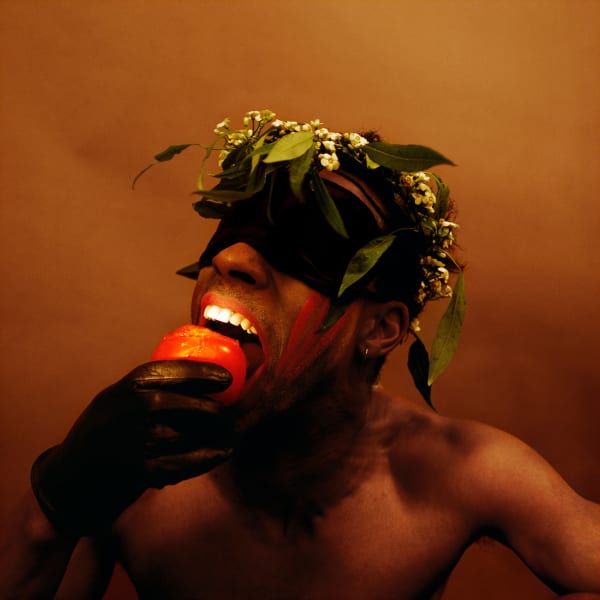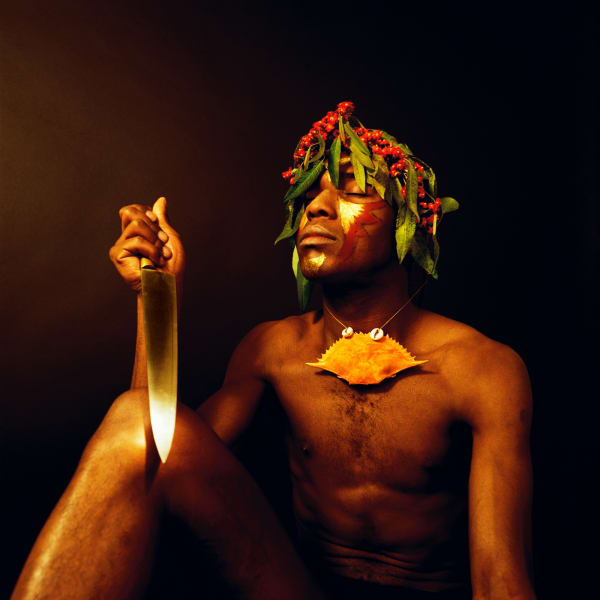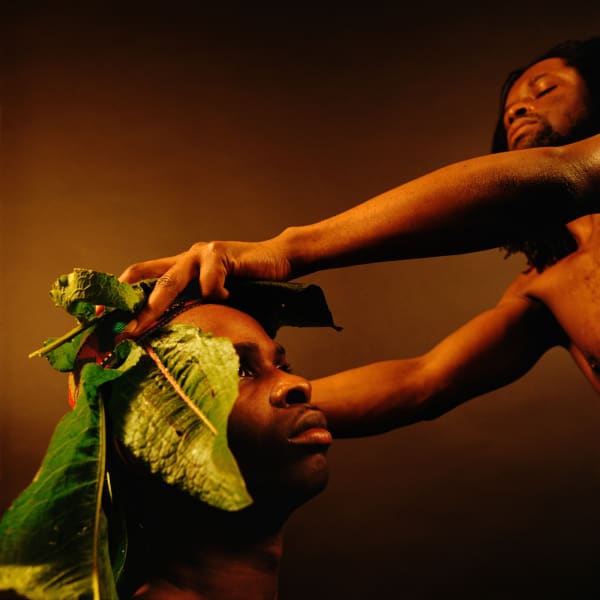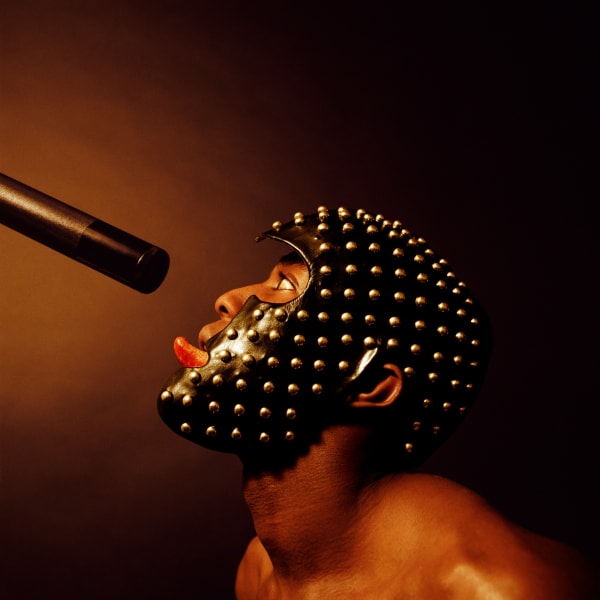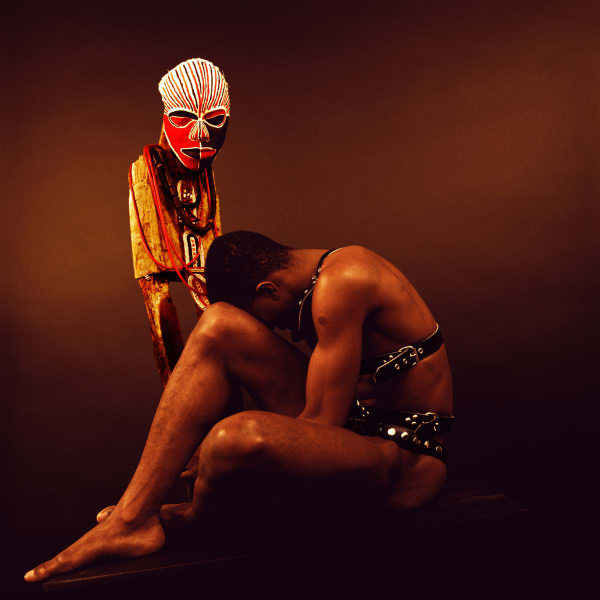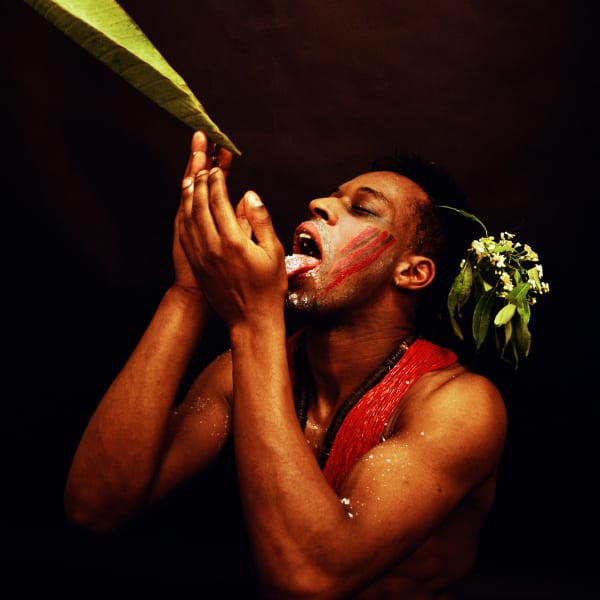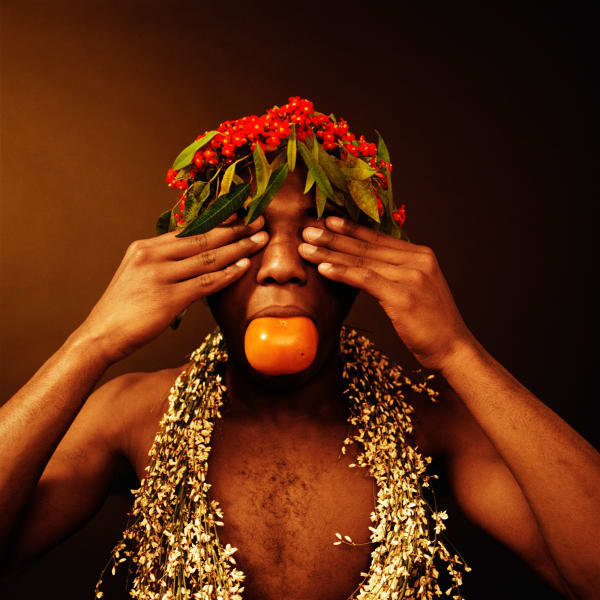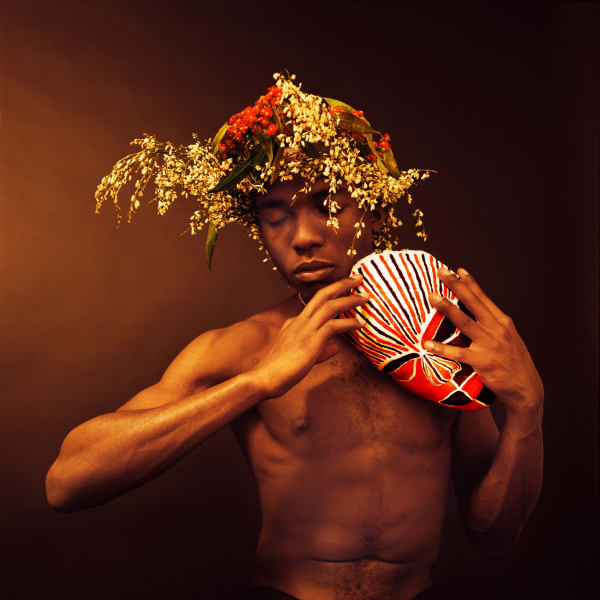Rotimi Fani-Kayode: Tranquility of Communion
Perhaps they would recognize my smallpox Gods, my transsexual priests, my images of desirable Black men in a state of sexual frenzy, or the tranquility of communion with the spirit world. Perhaps they have far less fear of encountering the darkest of Africa’s dark secrets by which some of us seek to gain access to the soul.
Rotimi Fani-Kayode, “Traces of Ecstasy,” Ten.8 Magazine, No 28: Rage & Desire, 1988
Hales is proud to announce Tranquility of Communion, a solo exhibition of photographic works by Rotimi Fani-Kayode, made between 1987–1989. This is the second exhibition of Fani-Kayode's work held at the gallery, organized in collaboration with Autograph London.
Fani-Kayode was born in 1955, in Lagos, Nigeria to a prominent Yoruba family before moving to England following the outbreak of civil war. He later studied at Georgetown University and the Pratt Institute in the USA, before settling permanently in London in 1983 where he lived and worked until his untimely death in 1989.
Fani-Kayode is a highly influential figure in the history of art who, despite a tragically brief career, produced a complex body of photographic work that explored themes of race, sexuality, spirituality, and the self. At the core of Fani-Kayode’s art was an emphasis on difference and otherness. The status of ‘outsider’ was one with which he identified on multiple fronts — from his ‘geographic dislocation’ to the exclusion he experienced as a result of his sexuality and artistic career — and which motivated him throughout his life.[1] Fani-Kayode’s powerful legacy continues to speak to urgent issues concerning identity politics, belonging and desire, and has deeply impacted subsequent generations of contemporary artists and photographers.
The exhibition takes its title, Tranquility of Communion, from the penultimate sentence of Fani-Kayode’s seminal essay, Traces of Ecstasy. Written in 1988, at a time when the AIDS crisis loomed, Fani-Kayode's fervent text contextualizes his practice within a period of prevalent racism and homophobia in Thatcherite Britain. He imagines what the future could hold for his work locally, globally, and specifically in his hometown of Lagos.
The exhibition features performative and meticulously crafted portraits in colour made in the final years of Fani-Kayode’s life. The chromatic works show a refinement of technique and mark a coalescing of ideas and sensibilities. Fani-Kayode had developed an exceptional aesthetic approach that embraced a constructed mise-en-scène dense with references to Yoruba cosmology. The Black male body was the focal point for an imaginative ‘exploration of the relationship between erotic fantasy and ancestral spiritual values.’[2] In richly saturated colour photographs, Fani-Kayode illuminates figures against dark backdrops, recalling the chiaroscuro of baroque painting. The staged compositions draw direct reference to the masterpieces of Caravaggio in his use of light, muscular bodies, gestures, and fruit.
Fani-Kayode skillfully combined the style of western Old Masters with traditional Yoruba iconography. Mirroring the rituals of Yoruba priests of Ife, from whom he was descended, his practice sought to emulate the priests’ ‘techniques of ecstasy.’[3] Bodies are posed in erotic acts of devotion, adorned in a mixture of fetish and traditional African attire – here the body acts as a divine messenger. Concepts of reality become ambiguous as Fani-Kayode continuously sought out the spiritual in his work.[4] He explored photography as ritual, the photographs themselves becoming talismanic objects existing beyond the realm of denotation.[5] Fani-Kayode drew parallels between his practice and Osogbo artists of Nigeria, whose artworks celebrate their personal connection to Yoruba cosmology and ancestral past. A recurrent theme in his work was the notion of Abiku, stemming from Yoruba mythology, meaning born to die — he had a sense of his own mortality from an early age.
The works in the exhibition are testament to Fani-Kayode’s practice, in which he visualized Black queer self-expression through a fusing of African and European cultures. Fani-Kayode interrogated histories, transcending his own marginalization to create powerful new realities. Pioneering at the time of creation, his oeuvre remains distinct and poignant.
Fani-Kayode has had numerous solo shows since the mid 1980s, including exhibitions at Riverside Studios, London, UK (1986); Harvard University’s Hutchins Center, MA, USA (2009); Autograph, Rivington Place, London, UK (2011); Iziko South African National Gallery, Cape Town (2014); Syracuse University Art Galleries, NY, USA (2016); Hales Project Room, NY, USA (2018); and Iceberg Projects, Chicago, IL (2019). In 2020, his work was featured in the major exhibition, Masculinities: Liberation through Photography, at the Barbican Centre, London, UK. In 2019, Fani-Kayode’s work was included in group exhibitions, Artist and Society: Intimacy, Activism and AIDS, Tate Modern, UK; Walkthrough British Art: Sixty Years, Tate Britain, UK; Implicit Tensions: Mapplethorpe Now, Guggenheim Museum, UK. In 2003, his work was featured in the 50th Venice Biennale, Italy and in 2011 in ARS 11 at Kiasma Museum of Contemporary Art, Helsinki, Finland. Fani-Kayode is represented in numerous public collections, including Autograph, London, UK; Tate, London, UK; Victoria & Albert Museum London, UK; Kiasma Museum of Contemporary Art, Helsinki, Finland; Krannert Art Museum, IL, USA; Chapman University, CA, USA; Guggenheim Museum NY, USA; Brighton Museum and Art Gallery, UK; Centraal Museum, The Netherlands; Museum of Fine Art, Houston, TX, USA; Carnegie Museum of Art, PA, USA; The Walther Collection USA/Germany; and Harvard University’s Hutchins Centre MA, USA.
Fani-Kayode was second chair of Autograph London, an organization which continues to represent, advocate, and preserve his work in their collection. Autograph shares the work of artists who use photography and film to highlight issues of identity, representation, human rights and social justice. Hales are delighted to be collaborating with Autograph to present Fani-Kayode’s work.
[1] Fani-Kayode, R. “Traces of Ecstasy,” Ten.8 Magazine, No 28: Rage & Desire, 1988
[2] Mercer, K. “Rotimi Fani-Kayode & Alex Hirst,” Autograph: London, 1996, p108
[3] Fani-Kayode, R. “Traces of Ecstasy,” Ten.8 Magazine, No 28: Rage & Desire, 1988
[4] Ibid
[5] Bourland, W. Ian. “Bloodflowers,” Duke University Press: Durham and London, 2019, p235

